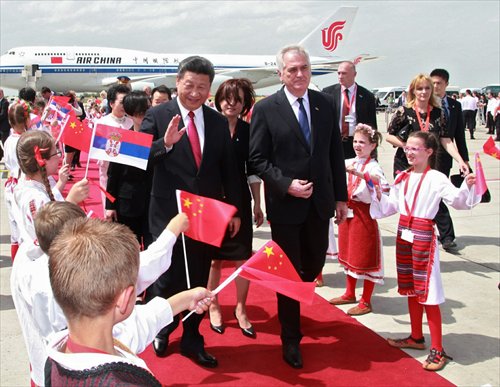HOME >> CHINA
Xi visit brings Belt, Road to Balkans
By Liu Xin Source:Global Times Published: 2016/6/18 1:18:01
Sino-Serbian deals spur industrial revival

Chinese President Xi Jinping (center left) is welcomed by children as he walks with his Serbian counterpart, Tomislav Nikolic, after arriving in Belgrade, Serbia on Friday. From Serbia, Xi will visit Poland and Uzbekistan. Photo: AP
Chinese President Xi Jinping arrived in Serbia on Friday in a State visit that experts said is aimed at boosting mutual trust and cooperation on industrialization and infrastructure with Central and Eastern Europe (CEE) and deepen ties with the EU."The traditional friendship between our two countries and peoples has stood the test of history amid the changes of the international landscape and our respective national conditions, and become even stronger," Xi said in a written speech delivered at the airport.
Xi noted the accelerated progress in bilateral ties, especially since the establishment of the strategic partnership between China and Serbia in 2009.
"China stands ready to work with Serbia to keep the momentum and push our relations and practical cooperation to a higher level, thus creating a new situation for our mutually beneficial cooperation and common development," he said.
During his stay in Serbia, Xi will meet his counterpart, Tomislav Nikolic for discussions on bilateral relations, the Belt and Road initiative and China-CEE cooperation, as well as global and regional hot-spot issues of common concern.
This is the first visit by a Chinese president to Seria in 32 years.
It is "a significant milestone for consolidating the traditional friendship between China and Serbia, deepening mutual political trust and promoting practical cooperation between the two countries," Assistant Foreign Minister Liu Xinghai said in a news briefing in Beijng on Wednesday.
"Cooperation between China and Serbia is promising since Serbia has great need of reindustrialization, especially in updating the steel industry and completing infrastructure, and China has the technology and experience needed," Gao Fei, a professor at the China Foreign Affairs University, told the Global Times on Friday.
The two countries will sign a number of cooperation documents covering areas including economic affairs, trade, production capacity and finance, according to China's Foreign Ministry.
Liu said Xi will pay a visit to the Smederevo steel mill, which was founded in 1913 and purchased by China's Hebei Iron and Steel Group with a 46 million euros ($52 million) agreement in April.
Sinisa Mali, the mayor of Belgrade, said that the two countries will sign an agreement worth 500 million euros on investment in the city's sewage facilities.
The People's Bank of China signed a currency swap deal worth 1.5 billion yuan with its Serbian counterpart on Friday to boost bilateral economic cooperation, the Xinhua News Agency reported.
The deal allows the two institutions to exchange payments in one currency for equivalent amounts in the other to facilitate bilateral trade settlements.
In an article published by Politika, a daily Serbian newspaper on Thursday, Xi said that aside from economic cooperation, there are personnel exchanges, and "sound cooperation in culture, education and science and technology, and regular inter-party and sub-national interactions."
The University of Belgrade and the University of Novi Sad have opened Confucius Institutes and construction will soon start on a China Culture Center in Belgrade, according to Xinhua.
Development chances
Xi also said that China will share the fruits of development and opportunities with Serbia, scaling up trade and investment in the context of the Belt and Road initiative and China and Central and Eastern Europe cooperation.
"Serbia sits at the intersection of Europe and Asia, which makes it important in boosting cooperation with CEE and supporting the Belt and Road Initiatives," Feng Zhongping, director for European Studies at the China Institutes of Contemporary International Relations, told the Global Times.
Within the China-CEE cooperation framework, or the "16+1" mechanism, major projects have been given the green light or are already underway, including a China-Europe land-sea express passage, freight train services to strengthen connectivity between China and Europe, and the construction and renovation of rail links between the Serbian and Hungarian capitals.
"Serbia could also bridge China and the EU, two of the largest economies in the world. China's efforts to deepen CEE ties should not be seen as attempting to split the EU but as building new platforms for both sides," said Gao.
From Serbia, Xi will travel to Poland where he will ink deals on finance, aviation, science and education.
In an interview with the Global Times, Miroslaw Gajewski, Polish Ambassador to China, said Poland can become a key partner in the Belt and Road initiative due to its position as a major transportation hub in Europe.
Xi will wrap the tour in Uzbekistan, where he will attend a Shanghai Cooperation Organization summit focusing on the fight against terrorism and crime.
Posted in: Diplomacy